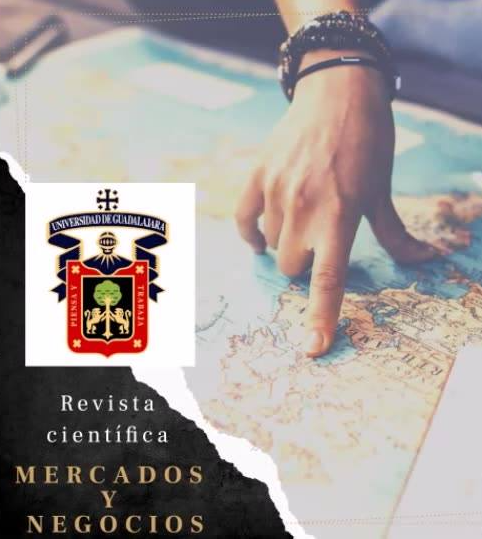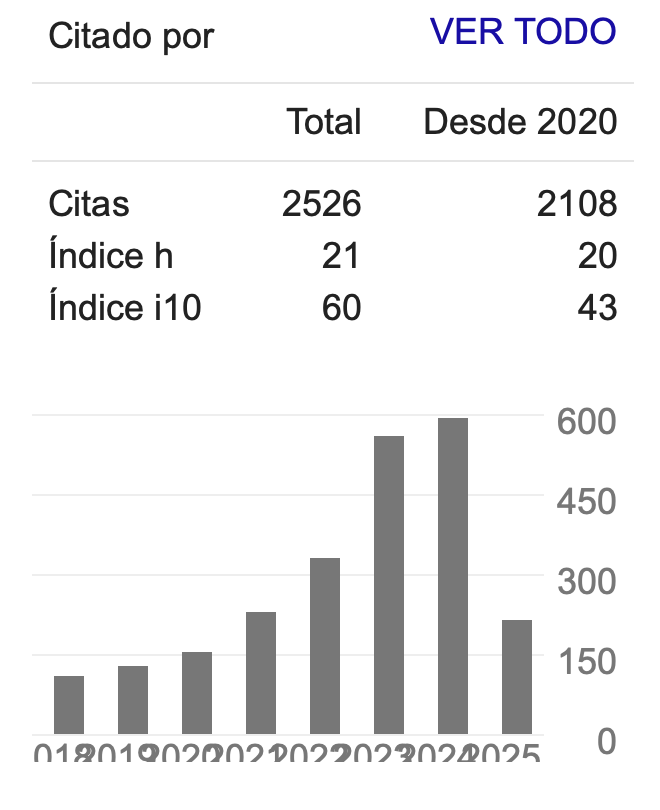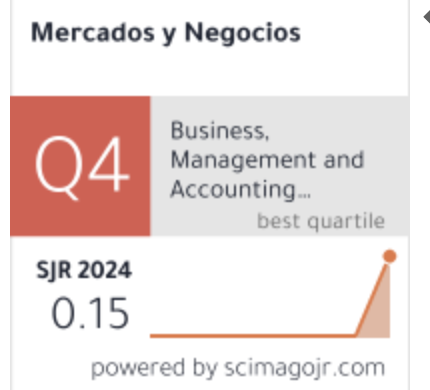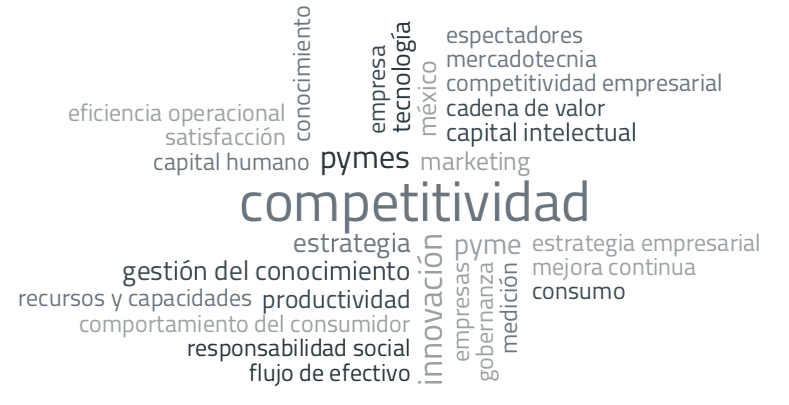La gestión del conocimiento como generador de competitividad: Aplicación en pymes de la zona metropolitana de Guadalajara
DOI:
https://doi.org/10.32870/myn.v0i18.5092Keywords:
gestión del conocimiento, competitividad, flujo e intercambio de informaciónAbstract
Referida por diferentes autores como la nueva forma de capital, así como la única fuente de ventaja competitiva sostenible, la gestión de conocimiento es un proceso esencial para las empresas, las cuales hoy en día se ha desarrollan en entornos sumamente competitivos. Este trabajo analiza el grado de gestión del conocimiento en 112 pequeñas y medianas empresas de la zona metropolitana de Guadalajara, México. El estudio se efectuó aplicando una encuesta a los niveles directivos de las organizaciones.El resultado final, al que se llegó gracias al análisis multivariable de los datos obtenidos en las encuestas aplicadas, es que en las empresas analizadas no existe un grado aceptable de gestión del conocimiento, por lo que su nivel de competitividad es bajo. actividades de creación de conocimientoReferences
Argyris, C. (2002). Double-loop learning, teaching, and research. Academy of Management Learning & Education, 1(2), 206-218.
Beyer, J. M., & Trice, H. M. (1982). The utilization process: A conceptual framework and synthesis of empirical findings. Administrative Science Quarterly, 591-622.
Brännback, M. (1997). The knowledge-based marketing concept–a basis for global business. Human Systems Management, 16(4), 293-299.
Brockman, B. K., & Morgan, R. M. (2006). The moderating effect of organizational cohesiveness in knowledge use and new product development.Journal of the Academy of Marketing Science, 34(3), 295-307.
Call, D. (2005). Knowledge management-not rocket science. Journal of Knowledge management, 9(2), 19-30.
Caplan, N. (1975). The Use of Social Science Knowledge in Policy Decisions at the National Level: A Report to Respondents.
Chen, L. Y. (2004). An examination of the relationships among leadership behaviors, knowledge sharing, and organization's marketing effectiveness in professional service firms that have been engaged in strategic alliances.
Chen, L. Y. (2006). Effect of knowledge sharing to organizational marketing effectiveness in large accounting firms that are strategically aligned. Journal of American academy of business, 9(1), 176-182.
Cuevas, M. E. M., & Tapia, R. M. (2006). Dirección, organización, y control de gestión de la información y del conocimiento de la empresa. Revista iberoamericana de Contabilidad de Gestión, (7), 9-46.
Council, G. K. E. Knowledge Management Vocabulary-Candidate Terms and Definitions. Working Document, Proposed American National Standard. 2001.
Craig, T. Y., & Kelly, J. R. (1999). Group cohesiveness and creative performance. Group dynamics: Theory, research, and practice, 3(4), 243.
Daft, R. L., & Macintosh, N. B. (1981). A tentative exploration into the amount and equivocality of information processing in organizational work units.Administrative science quarterly, 207-224.
Deshpande, R., & Zaltman, G. (1982). Factors affecting the use of market research information: A path analysis. Journal of marketing research, 14-31.
Drucker, P. (1992). La nueva sociedad de organizaciones (Traducción de Gretchen González del artículo original The New Society of Organizations, de Peter Drucker, publicado en Harvard Bussiness Review, septiembre-octubre de 1992). Revista Gestión y Estrategias, 5.
Drucker, P. F. (1995). Managing in a time of great change.
Earl, M. J. (1994, June). Knowledge as strategy: reflections on Skandia International and Shorko Films. In Strategic information systems (pp. 53-69). John Wiley & Sons, Inc..
Frankfort-Nachmias, C., & Nachmias, D. (1992). Research methods in the social sciences, (Edward Arnold, London). Pakistan Journal of Criminology.
Grundvåg Ottesen, G., & Grønhaug, K. (2004). Barriers to practical use of academic marketing knowledge. Marketing Intelligence & Planning, 22(5), 520-530.
Huber, G. P. (1991). Organizational learning: The contributing processes and the literatures. Organization science, 2(1), 88-115.
Hüther, M., Szyperski, N., & Freytag, A. (2000). Was ist wirklich neu an der “New Economy”?. Zeitschrift für Wirtschaftspolitik, 49(3), 285-312.
Jonscher, C. (1994). An economic study of the information technology revolution. Information technology and the corporation of the 1990s: Research studies, 5-42.
Kotler, P. (1988). Marketing management: Analysis, planning, implementation, and control.
Kleindl, B. A. (2000). Strategic electronic marketing: Managing e-business. Thomson South-Western.
Maturana, H. R., & Varela, F. J. (1987). The tree of knowledge: The biological roots of human understanding. New Science Library/Shambhala Publications.
McKenna, R. (1999). Real-time marketing (pp. 145-158). Harvard Business School Press.
Pelz, D. C. (1978). Some expanded perspectives on use of social science in public policy. Major social issues: A multidisciplinary view, 346-57.
Sanghani, P. (2008). Does organization size matter for starting knowledge management program?. The Icfai University Journal of Knowledge Management, 6(1), 7-20.
Simonin, B. L. (1999). Ambiguity and the process of knowledge transfer in strategic alliances. Strategic management journal, 20(7), 595-623.
Webster, M. (1996). Merriam-Webster's collegiate dictionary . Springfield, MA: Merriam-Webster.
Song, B. L. (2008). Research on organizational learning and knowledge creation. China-USA Business Review, 7(2), 25-28.Gòmez
Sveiby, K. E. (2000). Capital intelectual: la nueva riqueza de las naciones.Cómo Medir y Gestionar los Activos Intangibles para Crear Valor.. Barcelona:: Gestión.
Teece, D. J. (1998). Capturing value from knowledge assets: The new economy, markets for know-how, and intangible assets. California management review, 40(3), 55-79.
Wigand, R. T. (1997). Electronic commerce: Definition, theory, and context.The information society, 13(1), 1-16.
Wild, J. (1971). Zur Problematik der Nutzenbewertung von Informationen.Zeitschrift für Betriebswirtschaft, 41(5), 315-334.
Zeleny, M. (1989). Knowledge as a new form of capital. Human Systems Management, 8(1), 45-58.
Zeleny, M. (1989). Knowledge as a new form of capital, Part 2: Knowledge-based management systems. Human Systems Management, 8(2), 129-143.
Downloads
Published
How to Cite
Issue
Section
License
Mercados y Negocios by Department of Mercadotecnia y Negocios Internacionales. University of Guadalajara is licensed under a License Creative Commons Attribution-NonCommercial 4.0 International.
The author retains the copyright.








